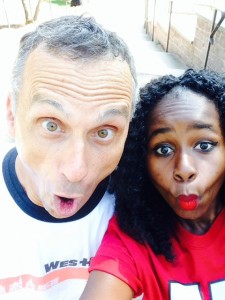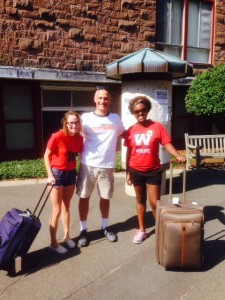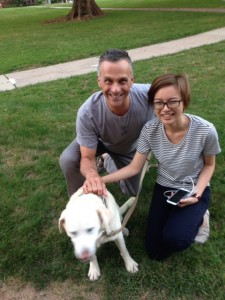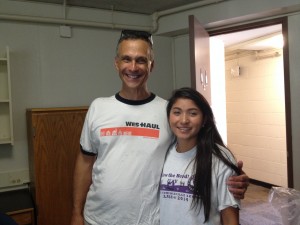Many of us have turned our thoughts and hopes toward the Wesleyan student injured this weekend at the Beta Theta Pi fraternity. The university will be updating the campus community about her condition as we receive more information from her family.
The semester is now well underway, even if some students are still finalizing their schedules. I’ve been talking with colleagues about their classes, and I’m always so impressed by their excitement and engagement with the course material and with their students. At Wesleyan we are fortunate to have so many fine teachers, and over the last several years we have added resources that encourage professors to share instructional techniques, including the use of new technologies. Great teachers are always learning.
Across the country, politicians, pundits and educators have been debating how we can improve instruction in the K-12 system. I recently reviewed a fine book on the subject, Elizabeth Green’s How to Build a Better Teacher. This is cross-posted with the Washington Post:
‘Building a Better Teacher: How Teaching Works (and How to Teach It to Everyone)’
by Elizabeth Green
Norton. 372 pp. $27.95
America has some of the best schools on the planet and one of the worst systems of education in the developed world. We have produced educational philosophies that have inspired teachers and students on every continent, but we have failed badly in implementing strategies that would either cultivate talents or address deficiencies.
This is not for lack of trying. Over a long period of time, federal and state governments have spent billions of dollars creating fancy programs dedicated to reorganizing where and how kids learn. In recent years we have built a testing industry based on the theory that if you can evaluate something, you can improve it. After all that effort, we have the tests, but where are the viable strategies for improving teaching and learning?
In “Building a Better Teacher,” Elizabeth Green examines the forces for and obstacles against change in our schools. But she doesn’t engage directly in the political debates that swirl around tenure, unions, cheating, over-testing and growing inequality. Instead, she identifies and dispels three deep sources of confusion: one myth and two inadequate arguments.
Green finds the “Myth of the Natural-Born Teacher” to be pervasive and pernicious. It attributes great teaching to personality traits that can’t be learned: “You either have it or you don’t.” This keeps us from developing a professional culture to improve teaching. Instead, we seek to hire people who have “it,” without defining what “it” is.
Two arguments that feed off this myth are labeled by Green accountability and autonomy. According to the first, we must measure a teacher’s results by testing his or her students (again and again). Data from the tests will be used to hold the teacher accountable (read: punishments and rewards) without a clue about how to improve performance. According to the autonomy argument, nobody can understand what goes on in a classroom better than teachers themselves. Instruction is so personal that we must respect the professional autonomy of teachers and let them do what feels right to them (whatever that is).
The myth and the arguments keep us from accomplishing what the philosopher John Dewey called for decades ago: develop “an analysis of what the gifted teacher does intuitively,” so we can create a culture in which effective teaching and deep learning take place.
Green describes with verve some of the key efforts to show that great teaching is a professional achievement rather than a natural ability. In the 1980s Lee Shulman recognized that teachers, like physicians, must learn how to combine their specific subject expertise with an ability to make that knowledge relevant to others. More recently, Magdalene Lampert has shown how sharing best classroom practices can promote teaching as a “complex craft” mastered over time. Green paints a picture of dedicated professionals striving to create a culture that can refine, share, improve upon and disseminate effective pedagogy. She points out that teachers need to know how to turn “a student’s slippery intuition into solid understanding” — and that this kind of knowledge can itself be taught.
Creating the infrastructure to develop this knowledge is a massive undertaking, given the scale of our heterogeneous systems. There are more than 3.7 million teachers in this country, and looming retirements mean that we can expect to hire around 3 million new teachers by 2020.
But the most interesting parts of “Building a Better Teacher” don’t have to do with numbers, systems or politics. Green is at her best when she describes how dedicated teachers work in the classroom. It isn’t nearly enough, she explains, for instructors to show their pupils how to get the right answers. Teachers have to divine why youngsters landed on the wrong answers and then steer them away from error so that in the future they can find their own way.
And that’s the key to great teaching at any level: cultivating in students the enhanced capacity to think for themselves in productive ways when they are no longer in the classroom or doing homework. This is so much more than following a rule or showing discipline (though both are often necessary). Green’s pages on teachers who help their students to think mathematically are particularly effective. But how to share teaching strategies that work?
Green compares the Japanese use of discussion sessions, jugyokenkyu, with the American reluctance to talk about teaching techniques at all. In Japan, regular observation and discussions turn the discovery of effective strategies in individual classrooms into a comprehension of craft that can be shared by a community of professionals.
A community of professionals is not the same thing as a union defending basic working conditions; nor is it a high-flying cadre of charismatic instructors whose students score well on exams. It’s the human core of effective instruction. All the testing in the world is just an “exoskeleton” and won’t provide this foundation.
Many obstacles inhibit the development of a culture for learning the craft of teaching. But Green emphasizes the ingredients for positive change that are currently in place. In addition to advances in teacher training, there are energetic entrepreneurs creating schools with ambitious, measurable goals: “The Common Core offered coherence, the research on teaching and teacher education offered a starting point for a curriculum, and the entrepreneurs added passion and a laboratory for experimentation.”
Now that we know how great a difference skilled teachers can make, we should leave behind the myth of the natural teacher, and our obsessions with accountability or autonomy. “The only logical conclusion,” Green writes, is “that American education ought to build a coherent infrastructure — clear goals, accurate tests, trained instructors — to teach teaching.”
Despite her lack of attention to the wider culture and context, Green’s account of passionate educators dedicated to their “complex craft” should be part of every new teacher’s education. It is vital for the United States to build better teachers to inspire the lifelong learning that not only our students but also their instructors so desperately need.










![photo[7]](https://roth.blogs.wesleyan.edu/files/2014/08/photo7-300x225.jpg)